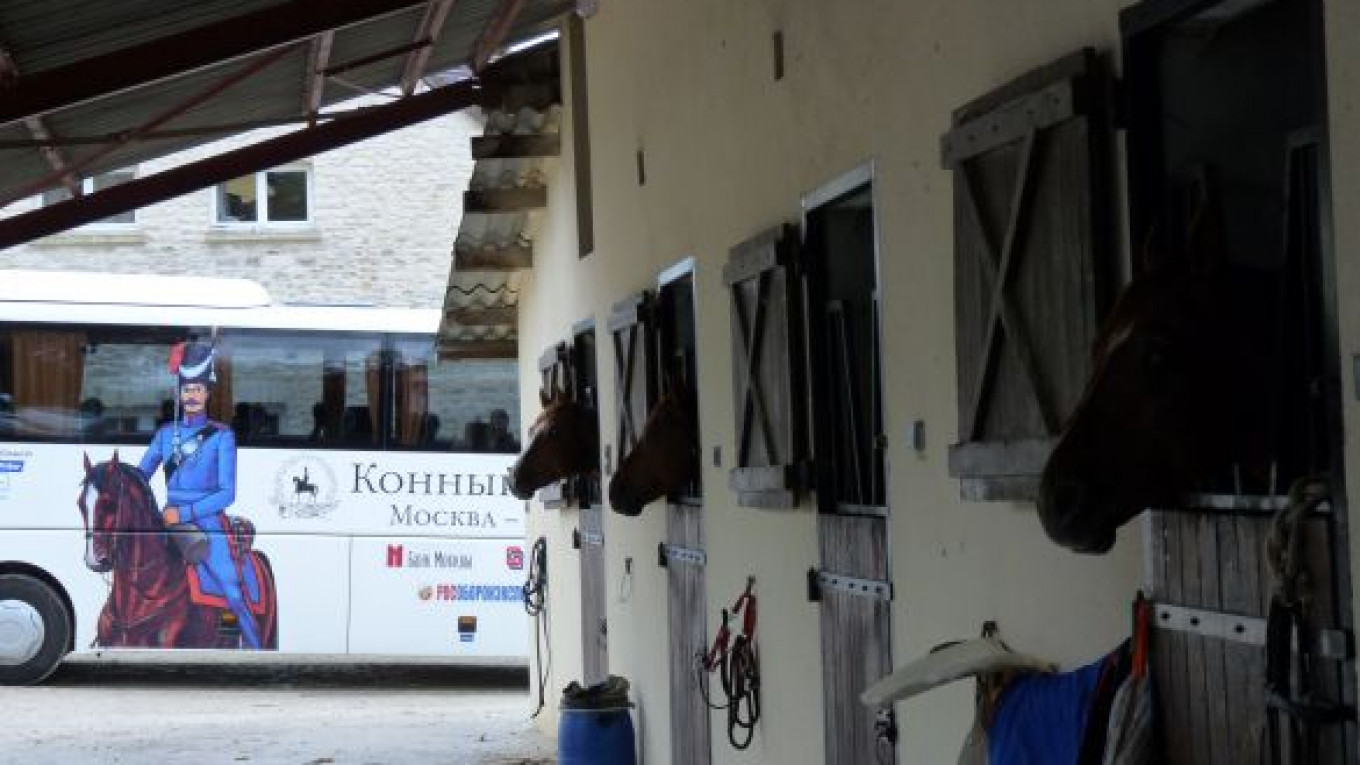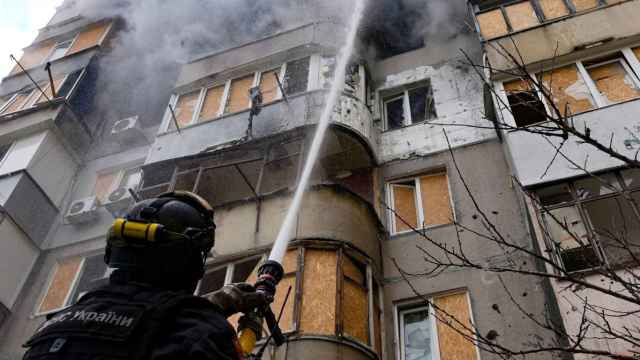LAGESSE, France — Deep in the Champagne region, on a stud farm surrounded by vineyards lain fallow and turning to mud in the autumn rain, Pavel Moshchalkov sits silently. An imposing presence — huge, with a tanned, hewn face — he sits with his head lowered.
"You mustn't hassle us. You mustn't come and prod us," he says, his speech deliberate, his voice commanding. His shoulders shamble forward. "We're like bears."
"You know what Alexander Nevsky said, 'Russians want to drink, to lie by the stove.' But then if you come —" He raises his huge hands, like claws, wide above his head.
Moshchalkov is an ataman, the leader of a regiment of 23 Don Cossacks riding to Paris on horseback to commemorate the 200th anniversary of Russia's Patriotic War of 1812, which devastated the invading French army and led to the capture of Paris and the abdication of Napoleon Bonaparte two years later.
The cavalry unit left Moscow in August on a horseback ride that would take them across Europe — through Belarus, Lithuania, Poland and Germany — retracing the journey of their forebears to their destination in Paris, a distance of some 2,800 kilometers.
Soon, on Oct. 20, the horsemen would gallop to the Palace of Fontainebleau to participate in a memorial show alongside the Red Army Choir and re-enact Cossack General Matvei Platov's victorious ride into the capital in 1814. Their trip comes at a time when Cossack culture is seeing a resurgence in Russian society.
On the morning I visit, the troops have been traveling for two months, keeping mainly to small towns — they prefer country folk to city slickers — and are within 200 kilometers of Paris. The tiny hamlet of Lagesse is playing host to the horsemen, billeting them in a large house attached to an indoor paddock.
The house is full of Cossacks. They sit around the kitchen table in their high boots and breeches; today they've abandoned their blue-and-red dress uniforms for more everyday military tunics.
They come and go, puffing on pipes below thick mustaches. One man stands in the kitchen, berating the French cooks over their stew. In a patterned silver cassock, a priest sits at the head of the table. He is in charge of protecting the regiment's icon.
Through a long window set in the wall, a group of young Frenchwomen are seen attempting to take running jumps onto three horses. One woman stops at the last moment.
"Cossacks can do that," a soldier says, with sheepish pride.
The Cossacks, whose ages range from 18 to 76, are accompanied by a 20-person support crew traveling by bus. We are told that "diplomatically" we had best meet the ataman first.
Moshchalkov dominates the regiment as well as the conversation. He is joined by one of his lieutenants, Volodya, an older Cossack in epaulettes whose kindly face behind the drooping ends of his mustache holds a look of endless comic bashfulness. The priest, Father Vladimir, sits to Moshchalkov's right.
The ataman explains that this is the first time in Europe for most of the men and they do not entirely feel at home. "I'm tired, I'm sick to death of Europe," Moshchalkov says. "People have been very good. Smiles everywhere. But there's no soup! Argh, borshch! Shchi!" he clamors. "And the cheese —" he spits. "And French drinks! Dry wine, yuck! Ah, for a hundred grams of vodka!"
"We couldn't live here. We have a different mentality than you," he continues. "In Europe everything is protected, Europeans are calculating. We live widely, we live with our souls. Maybe people don't like us for that, but that doesn't really matter. Our country is vast."
But Moshchalkov is pleased and grateful for the hospitality his men have received, particularly among equestrian clubs, which have supplied most of the group's accommodations and with which the pilgrimage was intended to develop relations.
"We've found a common language wherever we go," he says. "Horse people have a common language, they always understand one another. They speak with the soul."
He does not mention that a van carrying the group's uniforms was broken into shortly after arriving in France. In general, the trip has gone smoothly. "People stand on the street and applaud," the ataman says.
Between 1812 and 1814, General Platov led a vanguard of 60,000 Cossacks to Paris — bringing terror in his wake, as "liberated" German townspeople found themselves emancipated from their clothes and valuables. This time, the horsemen's mission is friendlier. While in Paris, the Cossacks intended to tour the Louvre, without their horses.
"This is a march of peace. We are coming in peace, not anger," the ataman says. "This march is to commemorate all who died, not just Russians. This is one of the things I like about Europe: the respect. The war memorials are looked after."
But as Moshchalkov tells us, Napoleon's defeat is not the reason for the trip, it is a "pretext," a pretext for Moshchalkov to draw attention to his beautiful horses and the depletion of their numbers following the collapse of the subsidies once provided by the Soviet government.
"Our horse farms in Russia are ruined," he says. "The government provides nothing." A mining engineer who worked in Africa for the Soviets, Moshchalkov has turned to horse breeding, endeavoring to restore the Don breed.
The Don horses are huge, beautiful animals, capable of traveling enormous distances without rest. A Don horse ridden by a Cossack can do 300 kilometers in a day. "It would kill another horse," the ataman says. "Four hours' rest, 20 hours riding. But that's —" (he pretends to spit). On the long ride from Moscow, they have kept to a more restrained 60 to 80 kilometers a day.
Outside, a young Cossack causes his mount to prance sideways past the door. The horse lets out a roaring bellow. I ask whether Moshchalkov hopes the march will inspire the government to offer some funding. He exchanges an ironic smile with the priest. He doesn't answer.
Like their horses, Cossacks have struggled to adapt to the modern era. Persecuted by the Soviets, the horsemen in the last two decades have continued to suffer from poverty and a loss of purpose. Father Vladimir, who now has changed his long, silvery robes for an ironed shirt and jeans, seems to act more like an official mouthpiece. He paints an optimistic picture of a Cossack future, speaking of Cossack schools in the city of Rostov-on-Don, where students "learn the history of the culture." "The best students — the most disciplined and organized — come from the Cossack Cadet School," the priest explains.
Moshchalkov is less optimistic. "How can we preserve our traditions?" he demands. "All our bearers of traditions are gone — annihilated. There's no longer a critical mass. But what's to be done?" he sighs. He stares gloomily at the table, a great weight seems to hinder him — the organization of the march? The fate of the Cossacks? Europe? "They're marvelous people. They've done so much for Russia," he says heavily.
The past two years have seen a surprising re-entry of Cossacks into public life, reviving their traditional role as the enforcers of the state, providing security for state enterprises and taking it upon themselves to police rallies for democracy and gay rights.
The second annual Cossack Village festival took place at Moscow's Luzhniki stadium on the same day as the Fontainebleau concert, with 1,500 Cossacks present. In August, Krasnodar Governor Alexander Tkachyov turned heads when he announced that Cossack paramilitary troops were to protect the region from illegal immigrants. Such patrols began in September.
Moshchalkov, for his part, shows little interest in such political moves, though, he says, he remains a supporter of President Vladimir Putin.
"They say Putin didn't win legally. That's a lie," he says. He defends the president's record, arguing that Putin inherited terrible problems from his predecessor, Boris Yeltsin, and says he is irritated by Western criticism of Russia. "I don't tell Englishmen how to live," he rumbles. "We know your European democracy. In 35 years, it'll be African."
The idea for the trip itself came not from the state but from Moshchalkov, who says the government loved the plan but quickly refused funding. The ataman raises his eyebrows. He explains that he and corporate sponsors were left to finance the ride.
According to Moshchalkov, the government "limited" its participation in the event by sending only a 300-person delegation, including the Kremlin's chief of staff, Sergei Ivanov, to the Fontainebleau concert.
"To get drunk by order of the president!" Volodya laughs.
"Two thousand, eight hundred kilometers!" Moshchalkov exclaims. "It's important for them [the other Cossacks] to see Paris — to be able to tell their grandchildren, 'I did it — I saw where my forebears had been.'"
In the background, behind the partition wall, one of the Cossacks begins to sing, loudly. Moshchalkov raises his eyes menacingly. Volodya jumps up quickly and hurries down the hall. A muffled remonstration is heard, and Volodya begins to stride back, smiling apologetically. But behind him, the singing begins again.
"Do they sing often?" my photographer asks.
"Yes, they sing on the road," Moshchalkov replies. "But Cossack songs are sad because the life of a Cossack is a sad one." "Argh, borshch!" he roars again. "With a little spot of smetana! Six more days and then home. Home."
A Message from The Moscow Times:
Dear readers,
We are facing unprecedented challenges. Russia's Prosecutor General's Office has designated The Moscow Times as an "undesirable" organization, criminalizing our work and putting our staff at risk of prosecution. This follows our earlier unjust labeling as a "foreign agent."
These actions are direct attempts to silence independent journalism in Russia. The authorities claim our work "discredits the decisions of the Russian leadership." We see things differently: we strive to provide accurate, unbiased reporting on Russia.
We, the journalists of The Moscow Times, refuse to be silenced. But to continue our work, we need your help.
Your support, no matter how small, makes a world of difference. If you can, please support us monthly starting from just $2. It's quick to set up, and every contribution makes a significant impact.
By supporting The Moscow Times, you're defending open, independent journalism in the face of repression. Thank you for standing with us.
Remind me later.






